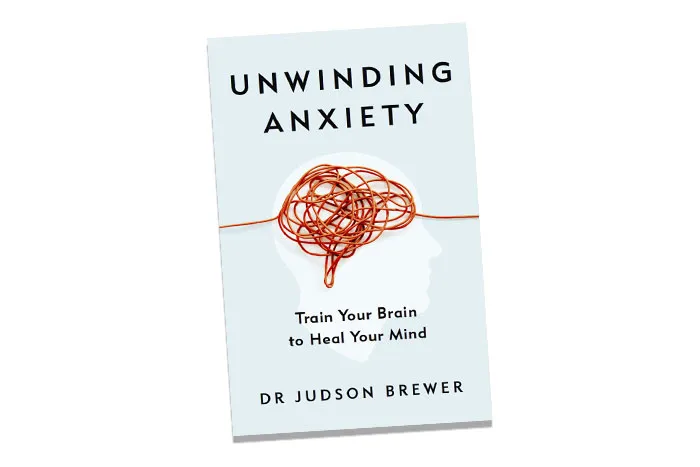From meeting the in-laws to, God forbid, walking towards a colleague in a long corridor and not knowing when to initiate eye contact, anxiety and panic are a common part of the human experience. However, while protecting you from perceived threats, you may find anxiety and its accompanying symptoms overwhelming.
If this sounds familiar, there are several research-backed methods that can help you manage anxious feelings. Well, if you know where to look. Unfortunately, many coping strategies that claim to alleviate anxiety aren’t backed by scientific experts, and many of these approaches could potentially exacerbate symptoms.
That’s why we’ve pulled together books from key experts that can help you better understand anxiety and develop methods to manage it.
The best books to help manage your anxiety in 2024
Unwinding Anxiety: Train Your Brain To Heal Your Mind

Dr Judson Brewer
A neuroscientist by training, Dr Judson Brewer has spent 20 years researching how experiences of anxiety can generate addictive behaviours that can deepen such feelings. In fact, his research shows that the feeling of anxiety itself can be addictive. But Brewer has good news also: while not an easy cycle to break, it's far from impossible.
Centred on the science of automatic behaviours, Unwinding Anxiety seeks to uproot anxiety by creating new habit loops. How? By identifying triggers, rethinking rewards and cultivating your curiosity. It’s by no means an easy task, but Brewer offers comprehensive instructions on each of these points, that, put together, create a roadmap for breaking cycles of anxious thoughts.
How to be Yourself: Quiet Your Inner Critic And Rise Above Social Anxiety

Dr Ellen Hendriksen
If the idea of speaking up at a work meeting, or even talking to strangers on the phone fills you with dread, Dr Ellen Hendriksen – regarded as one of the world's leading experts on social anxiety – has some advice for you.
In this clear and understandable practical guide, Hendriksen draws from decades of research to unpack several achievable strategies to help you quiet your inner-critic. Best of all, she explains why such strategies work: How To Be Yourself lifts the bonnet to the brain, revealing how your mind can be effectively rewired by challenging your current thinking and dispelling key psychological fallacies.
The outcomes are realistic too. As Hendriksen lays out, there isn’t a silver bullet cure for social anxiety. But there are simple techniques that will help you manage it.
Self-Compassion: The Proven Power Of Being Kind To Yourself

Dr Kristin Neff
For many, self-compassion is, at best, a vomit-inducing concept reserved for owners of ‘live, laugh, love’ home decor. And it would be easy to agree if it wasn’t for the growing body of compelling research showing how being kind to yourself is an effective way to manage your anxiety and overall happiness.
Key to this research is Dr Kristin Neff, associate professor of psychology at the University of Texas, Austin. In this book, she outlines the harmful psychological impacts of chronic self-criticism and the simple science-backed methods to reverse harmful emotional patterns.
Read more:
- What is high-functioning anxiety? How to spot it and what you can do about it
- Why is my brain buzzing at 3am, but comatose at 3pm?
Neff also dispels how self-compassion done right is not selfish or self-pitying – nor will it create complacency or weakness. Quite the opposite: with a stream of studies, she shows how treating yourself like you would a good friend can lead to greater resilience, productivity and even psychical health.
Sure, most of the practical advice comes with a hefty helping of unpalatable cheesy language. But the science shows that the more comfortable you get with it, the better you’ll manage anxiety in everyday life.
10% Happier

Dan Harris
Just over 5 million. That’s how many people watched US news anchor Dan Harris experience a panic attack live on air while reading a bulletin on behemoth TV show Good Morning America. It was, as Harris himself says, like being “stabbed in the brain with raw animal fear”. But although one of the most painful experiences of his life, it was also the most transformative, sparking Harris’s voyage to find science-backed self-help advice that works.
Read more:
- Why does drinking alcohol trigger my anxiety?
- Dr Michael Mosley: How deep breathing can soothe anxiety, help you sleep and more
It's by no means a straightforward journey. As documented in this dryly witty half-memoir, half-instructional guide, the relentlessly sceptical Harris puts major figures in the self-help world under the microscope, often exposing the flawed pseudoscience beneath their teachings. Eventually, after years of searching, the deeply cynical Harris finally delves into one practice proven to help manage anxiety: meditation.
But here’s the thing: not only does Harris give a compelling overview of the well-trodden scientific benefits of mindfulness meditation, but he actually gives a practical no-nonsense guide to how to do it. Better still, he delivers it with humour and levelheadedness, once and for all dispelling the idea meditation is mainly for, as Harris says, “people who live in yurts or collect crystals”.
- Buy now from Amazon (£6.10),Waterstones (£10.99)orFoyles for books (£10.99)
Be Who You Want: Unlocking The Science Of Personality Change

Dr Christian Jarrett
Penned by neuroscientist (and BBC Science Focus regular) Dr Christian Jarrett, Be Who You Want explains how being introverted and closed-minded – traits associated with those who struggle with anxiety – aren’t fixed attributes.
Sure, they’re moulded by your genetic influences and early experiences, but, as Jarrett argues with the help of leading psychological experts, they can be changed. This is done, as Jarrett describes in detail, by adopting a few simple transformative behaviours – small shifts that can make a huge difference to your wellbeing.
- Buy nowfromAmazon (£10.11),Waterstones (£10.99) orFoyles for books (£9.99)
Read more: